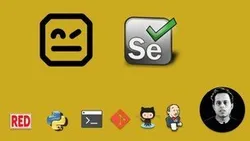
Selenium Java Framework from Scratch 
This comprehensive guide provides beginners with a step-by-step approach to creating a Selenium Java Framework from scratch. It is an invaluable resource for those looking to get started with automation testing. ▼
ADVERTISEMENT
Course Feature
![]() Cost:
Cost:
Free
![]() Provider:
Provider:
Udemy
![]() Certificate:
Certificate:
No Information
![]() Language:
Language:
English
![]() Start Date:
Start Date:
On-Demand
Course Overview
❗The content presented here is sourced directly from Udemy platform. For comprehensive course details, including enrollment information, simply click on the 'Go to class' link on our website.
Updated in [March 06th, 2023]
This course is designed for complete beginners who want to learn how to create automation frameworks using Selenium in Java. It covers the basic concepts and working of Selenium, Automation Frameworks, and how to create a Selenium Java Framework step by step.
Possible Development Paths include software testing, automation testing, web development, and software engineering. Learners can also pursue further education in computer science or software engineering.
Learning Suggestions for learners include brushing up on their knowledge of Java, HTML, and CSS. They should also become familiar with the basics of software testing and automation testing. Additionally, they should practice coding and debugging to become more proficient in Selenium.
[Applications]
After completing this course, learners will be able to apply the knowledge gained to create a Selenium Java Framework from scratch. They will be able to understand the basic concepts and working of Selenium, create automation frameworks, find web locators, setup Page Object Model, use TestNG, use Extent Reports, create data driven tests using Excel file, do logging, do exception handling, and run tests on headless browser.
[Career Paths]
1. Automation Tester: Automation testers use Selenium and other automation tools to create and execute automated tests. They are responsible for developing, maintaining, and executing automated tests to ensure the quality of software applications. Automation testers must have a strong understanding of software development and testing processes, as well as the ability to troubleshoot and debug automated tests. The demand for automation testers is increasing as more companies are looking to automate their testing processes.
2. Software Quality Assurance Engineer: Software Quality Assurance Engineers use Selenium and other automation tools to create and execute automated tests. They are responsible for ensuring the quality of software applications by developing, maintaining, and executing automated tests. Software Quality Assurance Engineers must have a strong understanding of software development and testing processes, as well as the ability to troubleshoot and debug automated tests. The demand for Software Quality Assurance Engineers is increasing as more companies are looking to automate their testing processes.
3. Automation Developer: Automation Developers use Selenium and other automation tools to create and execute automated tests. They are responsible for developing, maintaining, and executing automated tests to ensure the quality of software applications. Automation Developers must have a strong understanding of software development and testing processes, as well as the ability to troubleshoot and debug automated tests. The demand for Automation Developers is increasing as more companies are looking to automate their testing processes.
4. Test Automation Architect: Test Automation Architects use Selenium and other automation tools to create and execute automated tests. They are responsible for designing, developing, and maintaining automated tests to ensure the quality of software applications. Test Automation Architects must have a strong understanding of software development and testing processes, as well as the ability to troubleshoot and debug automated tests. The demand for Test Automation Architects is increasing as more companies are looking to automate their testing processes.
[Education Paths]
1. Bachelor of Science in Computer Science: This degree path focuses on the fundamentals of computer science, such as programming, software engineering, and computer architecture. It also covers topics such as artificial intelligence, data structures, and algorithms. This degree path is ideal for those interested in developing and testing software applications, as well as those interested in pursuing a career in automation engineering.
2. Master of Science in Software Engineering: This degree path focuses on the development and testing of software applications. It covers topics such as software design, software architecture, software testing, and software development. This degree path is ideal for those interested in developing and testing software applications, as well as those interested in pursuing a career in automation engineering.
3. Master of Science in Automation Engineering: This degree path focuses on the development and testing of automated systems. It covers topics such as robotics, automation systems, and automation engineering. This degree path is ideal for those interested in developing and testing automated systems, as well as those interested in pursuing a career in automation engineering.
4. Doctor of Philosophy in Automation Engineering: This degree path focuses on the research and development of automated systems. It covers topics such as robotics, automation systems, and automation engineering. This degree path is ideal for those interested in researching and developing automated systems, as well as those interested in pursuing a career in automation engineering.
The development of automation engineering is rapidly growing, and the demand for automation engineers is increasing. Automation engineers are in high demand in many industries, such as manufacturing, healthcare, and transportation. Automation engineers are responsible for developing and testing automated systems, and they are also responsible for ensuring that these systems are reliable and efficient. Automation engineers are also responsible for developing and maintaining software applications, as well as for developing and testing automated systems.
Pros & Cons

Explanation is good

Good course for beginners

Very helpful to understand framework

Much better than paid courses

Very informative

Video error getting for 2 sessions

Certificate not available

Poor subtitles quality
Course Provider

Provider Udemy's Stats at AZClass
Discussion and Reviews
0.0 (Based on 0 reviews)
Explore Similar Online Courses

Microsoft Office suite 2016 : Latest 2019

Growth Strategies for Business - Free Online Course

Python for Informatics: Exploring Information

Social Network Analysis

Introduction to Systematic Review and Meta-Analysis

The Analytics Edge

DCO042 - Python For Informatics

Causal Diagrams: Draw Your Assumptions Before Your Conclusions

Whole genome sequencing of bacterial genomes - tools and applications

Boost Your Game Performance in Unity 3D

ISTQB Certified Tester Foundation Level Training (CTFL)

Robot Framework RIDE & Selenium - Step by Step for Beginners
 Related Categories
Related Categories
 Popular Providers
Popular Providers
Quiz
 Submitted Sucessfully
Submitted Sucessfully
1. What is the main purpose of this course?
2. What type of prior knowledge is required for this course?
3. Which of the following is not covered in this course?


Start your review of Selenium Java Framework from Scratch